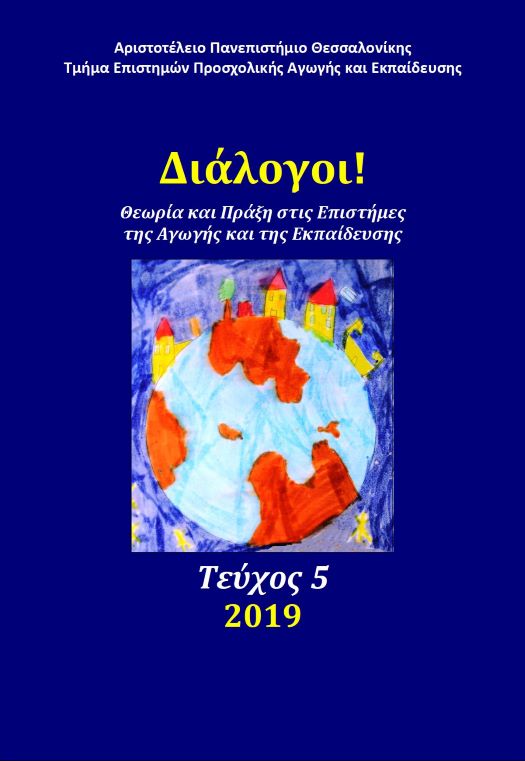Άντρες και μελλοντικοί νηπιαγωγοί: Διερεύνηση των αντιλήψεών τους για τον ρόλο τους

Περίληψη
Η παρούσα εργασία παρουσιάζει και αναλύει τις απόψεις αντρών και μελλοντικών νηπιαγωγών αναφορικά με την επαγγελματική τους ταυτότητα σε σχέση με το φύλο και τις προκλήσεις που αντιμετωπίζουν επιλέγοντας να φοιτήσουν σε έναν χώρο στον οποίο υπερτερεί το γυναικείο φύλο. Η μελέτη βασίζεται σε μια ποιοτική έρευνα που διεξήχθη μέσω ημιδομημένων συνεντεύξεων σε πέντε φοιτητές παιδαγωγικού τμήματος νηπιαγωγών. Η ανάλυση των δεδομένων αναδεικνύει πως ο κυρίαρχος λόγος αναφορικά με τις έμφυλες διαφορές είναι τόσο ισχυρός που, παρά τις ατομικές εμπειρίες σπουδών και εκπαιδευτικής πρακτικής των αντρών της έρευνας, η αμφισβήτησή του και η σύγκρουση με αυτόν συνιστά δύσκολο και απαιτητικό εγχείρημα. Σε αυτό το πλαίσιο, γίνεται προφανής η αναγκαιότητα ουσιαστικής ενασχόλησης με το ζήτημα της έμφυλης διάστασης στην προσχολική εκπαίδευση, τόσο στο επίπεδο των σπουδών, όσο και στο επίπεδο των παιδαγωγικών πρακτικών στο νηπιαγωγείο. Για την καλύτερη κατανόηση των πολλαπλών διαστάσεων της υποεκπροσώπησης αντρών στην προσχολική εκπαίδευση και για τις δυνατότητες αντιμετώπισής της απαιτείται περαιτέρω έρευνα σχετικά με τις αντιλήψεις, τις εμπειρίες και τους περιορισμούς που βιώνουν οι φοιτητές παιδαγωγικών τμημάτων προσχολικής εκπαίδευσης.
Λεπτομέρειες άρθρου
- Πώς να δημιουργήσετε Αναφορές
-
Σοφού Ε., & Στεργίου Λ. (2019). Άντρες και μελλοντικοί νηπιαγωγοί: Διερεύνηση των αντιλήψεών τους για τον ρόλο τους. Διάλογοι! Θεωρία και πράξη στις επιστήμες αγωγής και εκπαίδευσης, 5, 5–35. https://doi.org/10.12681/dial.20804
- Τεύχος
- Τόμ. 5 (2019)
- Ενότητα
- Επιστημονική Αρθογραφία

Αυτή η εργασία είναι αδειοδοτημένη υπό το CC Αναφορά Δημιουργού – Μη Εμπορική Χρήση – Παρόμοια Διανομή 4.0.
Οι συγγραφείς των άρθρων που δημοσιεύονται στο Διάλογοι! Θεωρία και Πράξη στις Επιστήμες Αγωγής και Εκπαίδευσης διατηρούν τα δικαιώματα πνευματικής ιδιοκτησίας επί των άρθρων τους, δίνοντας στο περιοδικό το δικαίωμα της πρώτης δημοσίευσης. Άρθρα που δημοσιεύονται στο Διάλογοι! Θεωρία και Πράξη στις Επιστήμες της Αγωγής και Εκπαίδευσης διατίθενται με άδεια Creative Commons 4.0 και σύμφωνα με την άδεια μπορούν να χρησιμοποιούνται ελεύθερα, με αναφορά στον/στη συγγραφέα και στην πρώτη δημοσίευση για μη κερδοσκοπικούς σκοπούς και με δικαίωμα τροποποίησης μόνον με παρόμοια διανομή (αν αναμείξετε, τροποποιήσετε, ή δημιουργήσετε πάνω στο υλικό, πρέπει να διανείμετε τις δικές σας συνεισφορές υπό την ίδια άδεια όπως και το πρωτότυπο).
To Τμήμα Επιστημών Προσχολικής Αγωγής και Εκπαίδευσης του Αριστοτέλειου Πανεπιστημίου Θεσσαλονίκης και το Εθνικό Κέντρο Τεκμηρίωσης διατηρούν το δικαίωμα να δημοσιεύουν, να αναπαραγάγουν, να παρουσιάζουν στο κοινό, να διανέμουν και να χρησιμοποιούν άρθρα που δημοσιεύονται στο Διάλογοι! Θεωρία και Πράξη στις Επιστήμες Αγωγής και Εκπαίδευσης σε οποιοδήποτε μέσο και μορφή είτε μεμονωμένα είτε ως μέρη συλλογικών έργων, για όλο το χρόνο διάρκειας προστασίας της πνευματικής ιδιοκτησίας και για όλες τις χώρες του κόσμου.
Αυτό περιλαμβάνει ενδεικτικά, και όχι αποκλειστικά, το δικαίωμα δημοσίευσης των άρθρων σε τεύχη του περιοδικού Διάλογοι! Θεωρία και Πράξη στις Επιστήμες Αγωγής και Εκπαίδευσης, αναπαραγωγής και διανομής μεμονωμένων αντιγράφων των άρθρων, αναπαραγωγής ολόκληρων των άρθρων σε άλλη έκδοση του Τμήματος Επιστημών Προσχολικής Αγωγής και Εκπαίδευσης του Αριστοτέλειου Πανεπιστημίου Θεσσαλονίκης και του Εθνικού Κέντρου Τεκμηρίωσης και αναπαραγωγής και διανομής των άρθρων ή περίληψης αυτών με χρήση πληροφορικού συστήματος αποθετηρίου.


